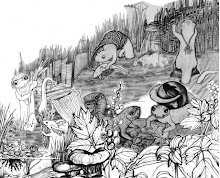Bridget had mentioned the link http://www.carmelclinic.com/Autism-Biomedical.htm in one of her comments. This link talks about the gastrointestinal issues that arise, in many people, but are overly prone to individuals with Autism or PDD. The doctor running this website and practice is Dr. Stacie Macari. She practices functional medicine, which is described below:
"The functional medicine approach looks deeper into the problem by looking deeper into the patient. You may say that functional medicine is patient centered rather than disease centered like conventional medicine. The science and strength of functional medicine begins with blood and urine laboratory panels designed to objectively measure your body's internal physiological pathways of tissue repair, immune function, energy production, detoxification, and metabolic signaling. By beginning at the cellular level and working our way up through each pathway we can identify what is not functioning and how to cure the problem at the precise level of dysfunction."
I mentioned in my previous blog that urine testing can be done in order to find out specific allergies that a child might have, which are similar to those associated with individuals on the autistic spectrum. I believe that the functional medecine and urinal testing approach is an extremely useful tool for parents and guardians of children with autism since it helps narrow down certain areas that are not functioning regularly. Since the autism spectrum is such a varied range it seems that narrowing down causes in the body would also be varied and difficult. If we can use this broad urine testing to narrow down areas in the body which can then be addressed and have a positive effect on a child's functioning ability, whether it be behaviorally or gastrointestinally, then I believe that is an extremely useful and beneficial tool.
The next blog will start looking into different products. On most of the websites I have found that the main diet for children with Autism, that is most beneficial is the GFCF-diet. Therefore I will be specifically posting information about those typese of products. I will also be posting information for raw food diets, since that diet easily fits into the GFCF-diet. There are many cookbooks availiable for families such as, The Kid Friendly ADHD and Autism Cookbook: The Ultimate Guide to the Gluten-Free, Casein-Free Diet by Pamela Compart and Dana Laake. There are certain appliances that a household may want to invest in to become more gluten free, such as a Mandolin Vegetable Slicer, in order to make vegetable pasta and vegtable lasagna. Another beneficial lifestyle change is using less toxic cleaning supplies and looking into digestive promoting enzymes.
A website that breaks down the need and usefulness for dietary change for children with autism is http://evolvingwellness.com/posts/200/a-possible-cure-for-autism-in-children-their-diet/ .
Sunday, July 26, 2009
Subscribe to:
Post Comments (Atom)

I think that the urine testing is really important. I also know that hair follicle tests can provide lots of information about what our bodies are lacking. I searched to see what I could find. The book "Changing the Course of Autism" had some information on the topic. It suggested that the hair from a child's first haircut could be used to determine mercury levels, and then uses scientific testing to argue that mercury is not a determining factor in the chapter, "Further Evidence Against Mercury".
ReplyDeleteI looked at another website:
http://www.autismstreet.org/weblog/?m=200607
and found the following similar information:
"The objective of this study was to assess the levels of 39 toxic metals and essential minerals in hair samples of children with autism spectrum disorders and their mothers compared to controls.
Iodine levels were 45% lower in the children with autism (p=0.005). Autistic children with pica had a 38% lower level of chromium (p=0.002). Autistic children with low muscle tone had very low levels of potassium (–66%, p=0.01) and high zinc (31%, p=0.01). The mothers of young children with autism had especially low levels of lithium (56% lower, p=0.005), and the young children (ages 3–6 yr) with autism also had low lithium (–30%, p=0.04).
Further investigations of iodine, lithium, and other elements are warranted.
Overall, it appears that the children with autism do not have major differences in their levels of toxic metals compared to controls."
Interesting information.